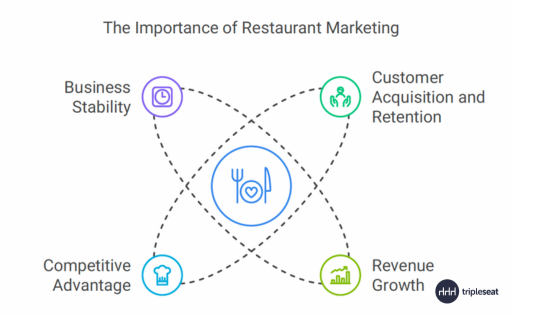Restaurant SEO: 9 Best Practices That Will Attract More Customers

Are you tired of empty tables on a Tuesday night? It’s more important than ever for restaurants to have a solid SEO strategy to attract customers in a competitive market. People now rely on search to discover restaurants like yours for traditional dining, take-out, catering, and on-premise events and private dining. Did you know there are more than 1 billion searches each month for restaurants?
SEO, or search engine optimization, is the strategic process of enhancing your online presence to attract more customers by improving how your website and content are discovered organically through search engines. Different from other marketing initiatives, when you optimize your site for search, you are ultimately working to improve the way your site is discovered organically online. In this article, we’ll share the top restaurant SEO tips.
Why Is SEO Important for Restaurants?
With most customers searching for restaurants online, a strong SEO strategy is essential for any restaurant looking to attract more customers. Here are some key reasons why SEO is important for restaurants:
- Increased Online Visibility with Good Restaurant SEO
A strong SEO strategy can help your restaurant rank higher in search engine results pages (SERPs), making it easier for potential customers to find you online. This increased online visibility can lead to more website traffic and customers.
- Better SEO Means Better User Experience
SEO is not just about optimizing for search engines, it’s also about creating a better user experience for your website visitors. By optimizing your website for SEO, you’ll also improve its overall usability, making it easier for customers to find the information they need, from your updated menu to booking a table, or even placing an online order, leading to a seamless and satisfying experience.
- Restaurant SEO is Cost-Effective Marketing
Compared to other marketing methods, SEO is a cost-effective way to attract more customers. By optimizing your website and online content, you can reach a larger audience without spending a lot of money on advertising.

Effective Restaurant SEO To-Dos
Now that you understand the importance of SEO for restaurants let’s dive into some specific tips to help you improve your online visibility and attract more customers. When thinking of the ways to optimize for search engines in these steps, keep in mind that you want to also optimize ulimately for your potential customers.
1. Optimize Your Website for Local SEO
Local SEO is crucial for restaurants as most customers search for a place to eat in their local area. The popularity of “near me” searches continues to rise. Ensure your website is optimized for local SEO by including your restaurant’s name, address, and phone number (NAP) on every page. You should also create a Google My Business listing. Ensure your restaurant’s GMB profile is active and updated with accurate details like your website, address, operating hours, phone number, and customer reviews.
2. Use Keywords Strategically
Keywords are the words and phrases customers use to search for restaurants online. Conduct keyword research to identify the most relevant and popular keywords for your restaurant and offerings. Remember that people won’t always search for the keyword “restaurant”. Some will search for more specific things like the type of food you offer, say Korean BBQ, or the overall style of your restaurant, like a romantic restaurant. If a person is looking to host a party, they may search for “private dining near me.” Unless you rank for these keywords, you’re missing out on potential customers.
You’ll need a keyword research tool to find restaurant-related services and topics people are searching for. Then strategically incorporate them into your website content, title tags, meta descriptions, and image alt tags.
3. Create High-Quality Content
Creating high-quality, relevant content is key to improving your SEO. Consider starting a blog on your website and regularly publishing articles about your restaurant, menu items, and events. This not only boosts your SEO but also provides invaluable insights to potential customers, building trust and excitement around your brand. Make sure high-quality images are also included of both your space and your menu items. Beyond articles about the restaurant/menu/events, think about content such as:
- Behind-the-scenes glimpses of your kitchen
- Chef interviews
- Recipes (if appropriate and not giving away secrets!)
- Local ingredient spotlights
- Stories behind your signature dishes
- Guest features/testimonials
4. Your Menu for SEO
Your menu is a crucial part of your restaurant’s website, and it should be optimized for SEO as well. Include keywords in your menu descriptions and use high-quality images to showcase your food and bev. You can also consider creating a separate page for your menu to make it easier for customers and search engines to find. Menu pages generally rank higher, so keep your menu page current and reflect your offerings. Have individual pages for popular dishes or categories if they are significant enough to rank for specific searches (e.g., “Best [Dish Name] in [City]”).
5. Encourage Online Reviews
Online reviews are an important factor in SEO, as they can improve your website’s credibility and online visibility. Encourage your customers to leave reviews on popular platforms like Google, Yelp, and TripAdvisor. You can also respond to reviews, both positive and negative, to show that you value your customers’ feedback.
6. Get Listed in Restaurant Directories
Listings in directories and mentions in articles not only increase visibility but also enhance your website’s rank authority, improving its likelihood of ranking higher in search results. There are many restaurant and hospitality directories and marketplaces such as EventUp, which rounds up restaurants and venues that provide private dining and events. Also, make sure your restaurant is listed on OpenTable, TripAdvisor, Yelp, and even local Chamber of Commerce directories.
7. Utilize Social Media
Social media is a powerful tool for restaurants to connect with customers and improve their online presence. Create profiles on popular platforms such as Facebook, Instagram, and Twitter, and regularly post updates, photos, and promotions. You can also use social media to engage with customers and respond to questions or feedback.
8. Monitor Site Analytics
To truly understand the effectiveness of your organic efforts, it’s important to regularly monitor your SEO analytics. Tools like Google Analytics can provide valuable insights into your website traffic, keyword rankings, and user behavior. Pay close attention to metrics like organic traffic, bounce rate, time on page, and conversion rates (reservations, online orders). This data will reveal what’s working and where adjustments are needed in your SEO strategy.
9. Stay Up-to-Date with Search Engine Optimization Trends
SEO is constantly evolving, and restaurants must stay up-to-date with the latest trends and best practices. Follow industry blogs and attend webinars to stay informed about any changes or updates in the world of search. Beyond industry blogs, consider following reputable SEO experts on social media, subscribing to newsletters from Google (e.g., Google Search Central blog), and attending relevant marketing webinars or conferences. This will help you stay ahead of the competition and continue to attract more customers.
By implementing these restaurant SEO tips, you can improve your online visibility and attract more customers to your restaurant. Remember to regularly monitor your optimization analytics and make adjustments to ensure that your restaurant stays at the top of search engine results pages and you increase your customer base.
Let Tripleseat Help with Added Customers with Private Dining and Events
Ready to get started? Learn more about Tripleseat’s tools for private dining here!
